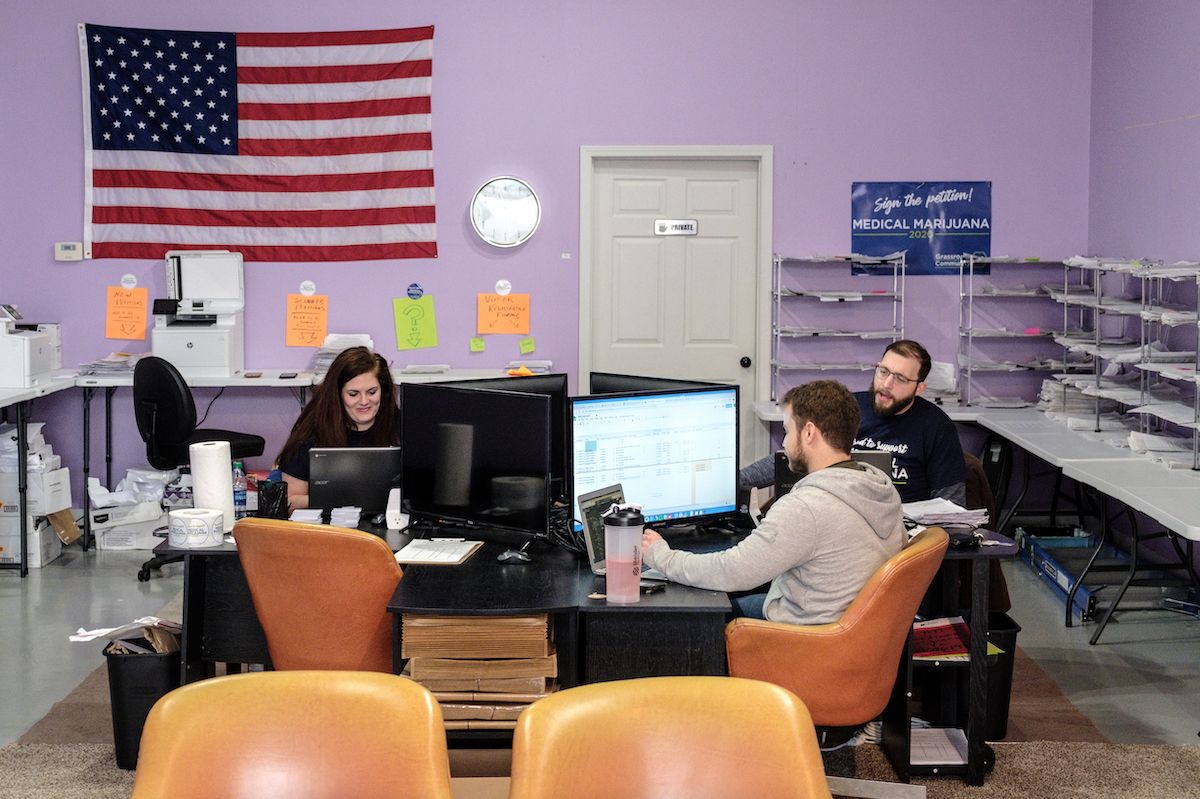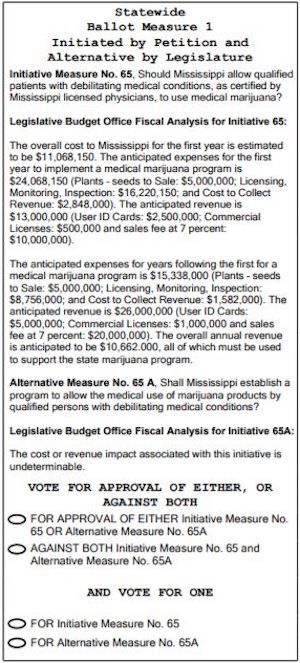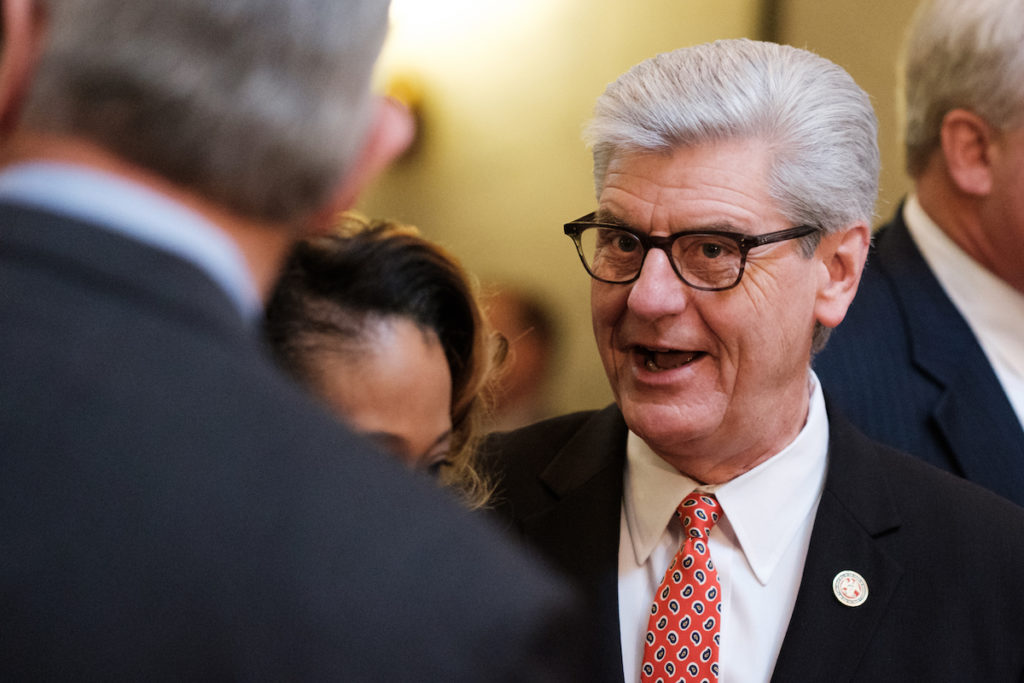Former Mississippi Gov. Phil Bryant is helping a political action committee that wants to stop voters from approving Initiative 65, which would legalize medical marijuana statewide. The initiative’s supporters, which include dozens of physicians across the state, say medical marijuana could help adults and children with illnesses like chronic pain, cancer and certain forms of epilepsy.
But Bryant, who left office when his second term expired in January, compared pro-medical marijuana forces to the tobacco industry.
“If you liked BIG TOBACCO, you are going to love BIG MARIJUANA,” the Republican ex-governor wrote in an op-ed that conservative blog Y’all Politics first published on Sept. 8. Bryant warned that “Initiative 65 would empower an unelected group of 11 Mississippians to run this new industry.”
Jamie Grantham, the communications director for the Medical Marijuana 2020 campaign, told the Mississippi Free Press on Sept. 9 that she believes Mississippians are on the side of legalization.
“The people who are speaking out against medical marijuana aren’t that many. They’re mostly bureaucrats,” she said. “The actual people of Mississippi want this.”
Since 2018, multiple polls have found that a majority of Mississippians favor legalizing medical marijuana.
‘There’s Never Been Medical Cola’
Members of the “unelected group” that Bryant referred to in his op-ed, the Mississippi State Board of Health, though, are working with or giving money to Mississippi Horizon—the anti-pot PAC that the governor backs. As governor, Bryant appointed all of the State Board of Health’s current members.
Campaign-finance reports show that board member James Perry, whom Bryant appointed in 2019, donated $1,000 to the Mississippi Horizon PAC on July 1. Perry, who is a banker and not a physician, is the managing director for Wells Fargo Securities.
Edward J. Langton, another banker whom Bryant appointed to the Mississippi State Board of Health in 2014, is also supporting the PAC’s efforts. In July, he spoke out against the initiative at an event in Ridgeland alongside State Rep. Jill Ford and Madison County Sheriff Randy Tucker.
“There’s never been medical cola, medical marijuana, medical whatever put in the constitution of the state of Mississippi. … Wealthy millionaires are trying to establish a new industry, a cartel in Mississippi for marijuana,” Langton, the CEO and chairman of the Board of Grand Bank in Hattiesburg, said at the meeting in late July. (In fact, the pharmacist who invented Coca-Cola, which then included cocaine, originally marketed it as having since-debunked medicinal uses).
Mississippi State Board of Health Chairman Dr. Thad Waites also gave $1,000 to the anti-medical marijuana PAC in July. Waites is a physician and a practicing cardiologist in Hattiesburg. Gov. Bryant’s predecessor, Haley Barbour, appointed Waites to the board in 2010, and Bryant reappointed him in 2016.

In January, the State Board of Health released a statement publicly opposing the medical marijuana initiative.
“Don’t be fooled, this proposal is not about medicine, and it’s not about parents with cancer or kids with epilepsy. … The proposed amendment to Mississippi’s constitution would allow marijuana use for broad and non-specific reasons and would allow for much more marijuana use than the limited examples often cited by the amendment’s proponents,” the board said in a Jan. 9, 2020, statement.
Though the board includes five doctors, the majority of the Mississippi State Board of Health’s members are not physicians, though one is a registered nurse. Seven medical professionals from across the state responded to the board’s denunciation of Initiative 65 in a joint statement with the Medical Marijuana 2020 campaign a week later, saying on Jan. 15 that the board’s statement was “filled with misinformation and outdated arguments.”
“The medical marijuana initiative is absolutely about medicine and is for Mississippians who have seen a family member suffer from cancer, epilepsy, or one of the other conditions,” the seven physicians said. “The campaign’s signature gatherers heard countless stories from families across Mississippi who are looking for another treatment option for their loved ones because traditional medication often does not handle their symptoms and/or has adverse and unwanted side effects.
“There are too many testimonials to count from families in other states with medical marijuana programs who say that medical marijuana positively changed their lives because it alleviated the symptoms of a condition that traditional medicine couldn’t help.”
Supporters of the medical marijuana initiative began collecting signatures to get the issue on the ballot in late 2018 and collected more than 200,000 signatures by the last fall’s deadline.
Barbour Firm Tied to Anti-Pot PAC
Though opponents of legalizing medical marijuana in Mississippi have amassed the backing of former Gov. Bryant and members of the State Board of Health, the anti-Initiative 65 PAC, Mississippi Horizon, has raised relatively little money since it launched in March.
Along with raising $1,000 each from Perry and Langton, the PAC has also raised $1,000 from Madison County attorney Andy Taggart, who ran unsuccessfully for the Republican nomination for Mississippi attorney general last year. Taggart vowed that, if he elected, he would have launched a “crusade” against drugs—an issue he has been passionate about since one of his sons died of suicide after a long battle with drug addiction.
By the end of August, the PAC had only one other donor: $500 from BullsEye Public Affairs, an Atlanta-based lobbying firm that has offices in Jackson and Tampa. Henry Barbour, the nephew of former Gov. Haley Barbour, who is also a big-time lobbyist, directs strategy at BullsEye. The Atlanta-based firm is part of a larger lobbying firm, Capitol Resources, LLC, where Henry Barbour is a managing partner.
Mary Hampton Nicholas, who is the treasurer for Mississippi Horizon, leads public relations for Capitol Resources and BullsEye.
Though Mississippi Horizon had only managed to raise $3,500 from four donors by August’s end, Mississippians for Compassionate Care, a pro-medical marijuana PAC, has already raised more than $2.1 million this year—including $1.38 million in August alone.
The August haul included $800,000 from First Commercial Bank in Jackson; $550,000 from Mississippi House Rep. Joel Bomgar, who is the CEO of a technology company; $30,000 from Jackson-based attorney Richard Schwartz; and a number of small donations from individuals across the state and from PACs outside Mississippi, including $2,500 from the D.C.-based NORML PAC and $13,500 from the Austin, Texas-based Marijuana Leadership Campaign.
This publication has attempted to reach Mississippi Horizon since last week. This afternoon, the Mississippi Free Press once again called the phone number listed on Mississippi Horizon’s website, which connected to Capitol Resources—the Jackson lobbying firm. The Mississippi Free Press left a message for Mississippi Horizon, but did not hear back by press time.
Initiative 65 A: ‘A Fake Option’
Grantham and other backers of the campaign do worry that the initiative’s wording on the November ballot could cause problems, though. Earlier this year, the Mississippi Legislature inserted a second option on the ballot, “Initiative 65 A.” The alternative amendment claims to legalize medical marijuana, but provides no provisions or regulations for enacting it, unlike the campaigners’ provision.

Grantham called 65 A a “fake option” that “only mentions terminally ill patients” and includes no list of conditions that a doctor could prescribe medical marijuana to treat.
“The way 65 A is vague. It doesn’t include a caregiver clause, which is critical, because with a caregiver clause, minors like kids with epilepsy or patients who are homebound or disabled literally won’t be able to participate in the program,” Grantham said. “There’s also no start date, so there’s no accountability in 65 A that they would actually have to implement the program. It doesn’t even name the Legislature as the ones who have to implement it. When I say 65 A is vague, I mean it in all capital letters. No one is accountable to implement medical marijuana under it.”
To cast a vote to legalize medical marijuana on the November ballot, voters must complete a two-step process. First, they must mark that they are voting “FOR APPROVAL OF EITHER Initiative Measure No. 65 or Alternative Measure No. 65 A.” Then, beneath that, voters must vote “FOR Initiative Measure No. 65,” Grantham said. But voters also have the option to vote “AGAINST BOTH” on the first part and to vote “FOR Alternative Measure No. 65 A” on the second part.
In 2015, supporters of Initiative 42, which would have required the Mississippi Legislature to fully fund public education under the Mississippi Adequate Education Program guidelines, blamed that initiative’s narrow defeat on a similar legislative trick. That year, Republican leaders in the Mississippi Legislature tacked “Initiative 42A” onto Initiative 42, the pro-school funding amendment. That ballot included a two-step process, too.
Grantham said the campaign is working to avoid Initiative 42’s fate by ensuring Mississippi voters know how to cast their ballots in favor of Initiative 65.
“The goal of 65 A is to confuse voters and leave us where we are now: without a medical marijuana program for patients desperate for another option,” she said.
‘A Strong Chance of Passage’
Grantham said the Medical Marijuana 2020 campaign is working to educate voters ahead of the election to ensure they know how to cast a ballot in favor of legalizing medical marijuana.
In May, the Los Angeles, Calif.,-based polling firm, FM3 Research, conducted a survey of 600 “likely November 2020 general election voters in Mississippi,” and found that 81% of Mississippians favor legalizing medical marijuana, including 68% who say they “strongly favor” it. Only 13% of likely voters said they oppose it. When the firm asked that question in February-March 2018, 77% of likely voters supported legalization, including 51% of Mississippians said they “strongly favored” it. Then, 20% of respondents said they opposed medical marijuana.
The poll found broad support across all groups, with 89% of voters over age 50 backing legalization alongside 89% of voters under age 50. Among white voters, 79% supported medical marijuana, joined by 86% of Black voters. Among Mississippians who described themselves as “frequent churchgoers,” 68% supported legalizing medical marijuana.
“In summary, Initiative 65 stands a strong chance of passage in November 2020 in Mississippi,” the pollster said in a June 12 memo, noting that the survey had a margin of error of +/-4.0%.










